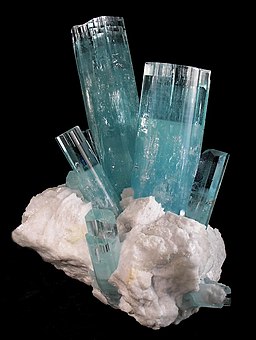
However, the abundance of this mineral doesn’t mean that the each and every excavated specimen of the stone is worthy of being faceted into a gem. Jewelers usually prefer to facet only those goshenites into ornamental stones that are transparent and free of every impurity. It is important to mention that the goshenite is also considered the mother of crystals because of its pure existence in nature. The naturally occurring specimens of this crstal contains nearly no chemical impurities.
Goshenite is a Modern Gemstone
Unlike many gemstones that have been in human use for centuries, goshenite is comparatively a modern gemstone. People only came to know about this variant when it was discovered from a small mine in Massachusetts as slightly white and opaque during the 19th century. Soon after that, miners started to look for this gem in other geographical locations. Now, it is found in nearly every part of the world. However, the most notable goshenite mines are in South America and the gem-grade goshenite is mostly mined from Brazil.
The Name of the Stone
Since this mineral is a modern gemstone, no Greek or Latin etymologies are attributed to its name. The gemstone is named after the locality where it was first found. Goshen, a small town in Hampshire County, Massachusetts had a small area from where the first goshenite specimen was mined.
Goshenite and Similar Gemstones
 Because of its transparent and whitish appearance, goshenite resembles many other minerals. For instance, it will be difficult to distinguish for a non-expert if a specimen is placed among white zircon, white sapphire, or white quartz.
Because of its transparent and whitish appearance, goshenite resembles many other minerals. For instance, it will be difficult to distinguish for a non-expert if a specimen is placed among white zircon, white sapphire, or white quartz.
Goshenite and Diamond
Some really fine and transparent pieces of this gemstone can also give the impression of a diamond. However, such specimens are really hard to find. Moreover, this rare mineral can be distinguished from diamonds by analyzing one definitive gem characteristic called fire.
Fire is a geological term for dispersion. It entails the ability of a gemstone to break down the light into a spectrum when exposed to a light source. The dispersion or firing capability of a diamond is second to none. One can easily tell diamond and goshenite specimens apart by observing them from different angles in an illuminated space. The diamond specimen would produce quick flashes on the exposure of light. On the other hand, goshenite stones can’t produce the same flickers in a similar setting.
One can also tell goshenite from diamonds specimens by conducting a hardness test. Goshenites are way softer than diamonds. Therefore, they can easily get scratched. Nevertheless, it can be used as an inexpensive alternative to diamonds in jewelry items. Many jewelers offer goshenite-laden necklaces, rings, and pendants. Amid all its use as an ornamental article, the greater demand for this gemstone is attributed to stone collectors.
Goshenite and Metaphysics

The metaphysical uses of minerals have been discussed several times in this section. There are many people who strongly believe in this branch of philosophy and subsequently use several everyday items in accordance with the principles of metaphysics. Like any other naturally occurring stone, there are many metaphysical uses of goshenite. It will be fitting to discuss some of them in this article.
Healing Energies of Goshenite
People who believe in healing energies of gemstones call goshenite as a crystal of the moon. All those stones associated with moons are believed to improve the balance of hormones and bodily fluids. Therefore, the stone is used by some to treat mood disorders stemming from postnatal depression, PMS and bipolar disorder.
Goshenite and Chakra Therapy
Chakra therapies are based on the ancient Sanskrit dogma that our physical and spiritual being is governed by seven wheels (chakras) of energy located at different positions on the body. Different gemstones are believed to activate these chakras to benefit the treated individual.
Goshenite is known to activate the Crown Chakra that is located at the top of the head. This chakra is believed to expand our understanding of the world beyond the existing reality. It is also known to provide a gateway to our beliefs, universal energy and truth. In short, the use of goshenite in Chakra therapies entails a peace of mind while providing more clarity regarding the surrounding universe. During Chakra therapies, goshenites are used with other stones to enhance their healing properties. In addition, it can also be used on any of the seven Chakras to clear and revitalize the given body area.
Goshenite as a Zodiac Stone
Like any other beryl stone, goshenite is considered a Zodiac stone for Taurus. However, it is deemed suitable for Cancerians as well. Due to its association with the moon, it is known for clamping down the predisposition of impulsively charging ahead.
Goshenite and Feng Shui

For instance, goshenite is associated with metal energy. This Feng Shui energy can be optimally harnessed in the west and northwestern portion of a residence or room. Metal elements, as described by Feng Shui, school of thought, fetch the attributes of determination and concentration in our lives and residential settings.
Feng Shui experts recommend the use of goshenite in the residential spaces used for any work of concentration or group tasks. It is believed that the presence of this stone in its surrounding helps in solidifying the determination and the efforts being made in a particular space.
